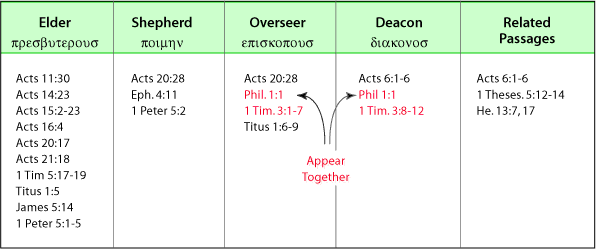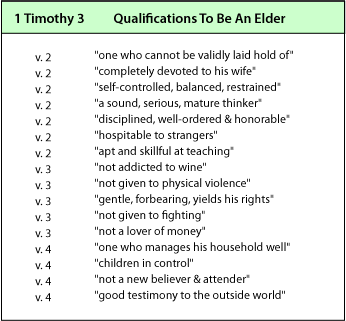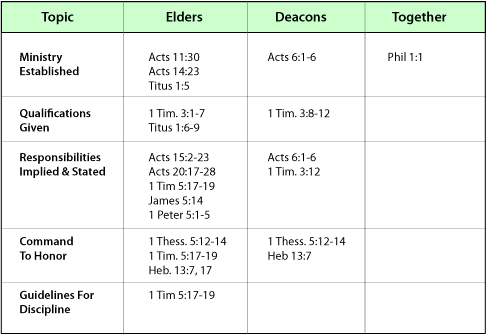Bible Question:
Is the position of a paid pastor truly biblical or something that men have created? Some say the institutional church has no biblical right to exist.
Bible Answer:
The first part of your question has been answered by a previous question and answer entitled, “Is it right for pastors to get paid as a profession?”
New Testament Times
What do we mean by “institutional church?” There are different kinds of organizational structures and degrees of control and formality. The New Testament does call for a church with elders and deacons. The book of Philippians tells us that the church at Philippi had both.
Paul and Timothy, bondservants of Christ Jesus, to all the saints in Christ Jesus who are in Philippi, including the overseers and deacons . . . Philippians 1:1 (NASB)
In this passage, the apostle Paul speaks first to the general congregation and then to the elders and the deacons. The leaders are addressed last and not first. That is the way it should be in the church. The New Testament recognized only two types of leaders in the church: elders and deacons. There are many passages in the New Testament that refer to elders and deacons.

The early church had both overseers and deacons. We can also find both of them in 1 Timothy 3. 1 Timothy lists the qualifications required for any male who will be part of the leadership team. Both elders and deacons are included, and no other category of leaders is mentioned.

The New Testament does not see any difference between an elder, a bishop or a pastor. They are the same person or office. Titus 1:5 and 7 reveals this when it uses “elder,” and “overseer” for the same person.
For this reason I left you in Crete, that you might set in order what remains, and appoint elders in every city as I directed you, namely, if any man be above reproach, the husband of one wife, having children who believe, not accused of dissipation or rebellion. For the overseer Titus 1:5-7 (NASB)
An elder is also an overseer. Later in 1 Peter 5 we discover that an elder is also a pastor, when the apostle Peter encourages elders to do “their job,” that is, to pastor (“to shepherd”) the flock.
Therefore, I exhort the elders among you, as your fellow elder and witness of the sufferings of Christ, and a partaker also of the glory that is to be revealed, shepherd the flock of God among you, exercising oversight not under compulsion. . . 1 Peter 5:1-2 (NASB)
All three terms – elder, overseer, and pastor – are grouped together in Acts 20:17-28. Here we find that the apostle Paul had asked for the elders of Ephesus to come to him. Upon arriving in Ephesus, Paul meets these men, and while speaking with them he says they are overseers and commands them “to shepherd” the congregation.
And from Miletus he sent to Ephesus and called to him the elders of the church . . . Be on guard for yourselves and for all the flock, among which the Holy Spirit has made you overseers, to shepherd the church of God which He purchased with His own blood. Acts 20:17, 28 (NASB)
What was the institutional organization of the church in the New Testament? It had both elders and deacons. The elders functioned as pastors and as equals. The two groups had different responsibilities.

The elders had the responsibility to provide direction, and the deacons served or supported the will of the elders.
Institutional Church Today
Few churches follow the New Testament pattern. Today most churches are organized to please men. The most serious problem in the church today may be not the organizational structure but the heart attitude of the men who are in ministry. Here is a wonderful quote from a Gene Getz.
People tend to extol human leaders, to put them on a pedestal, and – to make this item very personal and relevant – in a sense to become ‘pastor-worshippers [or elder-worshippers].’ Most Christians would be horrified at this accusation. But, unfortunately, it cannot be denied.
Every Christian leader must constantly strive to keep his people from becoming overly dependent upon him. He must strive to ‘equip the saints’ to minister to each other and to keep their primary loyalty centered on Christ. Unfortunately Christian leaders are human beings. To be honored and respected – both biblical injunctions – is highly satisfying psychologically. Ego-building is a pleasant experience. And it is tragic when spiritual and emotional immaturity causes a man [or men] to build a work around himself and not around the body of Christ, and particularly its Head – Jesus Christ. The work is destined for trouble, no matter how large it grows. Growth in size must be commensurate with growth in spiritual maturity. Results must be both ‘qualitative’ and ‘quantitative.’
All Christian leaders must remind themselves that we are but ‘human means’ to achieve ‘divine ends.’ The true test of our success lies not in numbers, activities, or loyalties. We are successful only as we are used of God ‘to equip the saints’ to function in the body; we are successful only when the body grows and develops and ultimately manifests the ‘more excellent way’ – the way of love and unity – followed by a strong faith and a steadfast hope.
. . . multiple leadership in the church is a New Testament principle. The ‘one man’ ministry is a violation of this important guideline. The scriptures frequently stress the ‘mutuality of the ministry.’ No local church in the New Testament was ruled and managed by one person. Plurality of elders appears as the norm.
This also means that the minister or pastor as we conceive of him in many churches today is not ‘head of the church’ or the ‘president of the corporation.’ . . . Their flock, conditioned to such an approach, either dutifully attend each service and activity of the church and say ‘amen!’ or they react against such unbiblical approaches and leave the church to find a more pleasant pasture in which to graze.
Naturally there will be some functional problems when more than one man [a plurality of leaders] is classified as the spiritual leader [leaders] in the church. But this need not be, when a man who serves as a full-time pastor-teacher recognizes his position as an elder ‘worthy of double honor.’ He is only one among several qualified men designated as spiritual leaders in the church. The time he spends, or his academic training, or his remuneration does not automatically entitle him to more power. In fact, the more training he has and the more remuneration he receives, the more responsible he is to serve. Though ‘greatest’ in one sense, in another he is to be ‘servant of all. (Getz, Gene A. Sharpening the Focus of the Church. Moody Press., Chicago. 1974, p. 120-121)
Conclusion:
In summary, the New Testament church leadership was comprised of elders and deacons. But these leaders were to be different from the world’s concept of leadership (Jesus states that biblical leadership is contrary to that practiced in the world). Jesus tells us that elders and deacons are to be servant-leaders of the flock of God. In Matthew 23:10-12 Jesus said,
And do not be called leaders; for One is your Leader, that is, Christ. But the greatest among you shall be your servant. And whoever exalts himself shall be humbled; and whoever humbles himself shall be exalted. Matthew 23:10-12 (NASB)
Or again in Mark 10:42-45,
. . . You know that those who are recognized as rulers of the Gentiles lord it over them; and their great men exercise authority over them, But it is not so among you, but whoever wishes to become great among you shall be your servant; and whoever wishes to be first among you shall be slave of all. Mark 10:42-45 (NASB)
Our Lord uses two very important words in this passage. They are the Greek words for servant and slave. R. C. H. Lenski says,
A [servant] is one who is intent on the service he is rendering to others. Greatness in the kingdom is measured by the readiness and the amount of blessed ministrations rendered to Christ’s people. Whether they reward and exalt us for this service or not makes no difference. The idea is carried to its climax. One may will with a holy will to be “first,” above even those who are “great” in the kingdom. The way to attain this height is to be ‘your slave’ . . . the humblest and lowest of all servants who actually slaves for others for Christ’s sake, and who despite all his slaving is ready to be left without reward of honor. (Lenski, R. C., The Gospel of Mark, Augsburg Publishing House., 1961, pp.)
That is the biblical role of an elder or pastor. God calls us to respect such an elder.
They did not honor the priests . . . Lamentations 4;16 (NASB)
But we request of you, brethren, that you appreciate those who diligently labor among you, and have charge over you in the Lord and give you instruction . . . 1 Thessalonians 5:12 (NASB)
Suggested Links:
A Call: Teach The BibleWho are the elders? Are they pastors?
Where in the New Testament does it describe the pastor's duties to his church?
Is it right for pastors to get paid as a profession?
God's Design For The Church